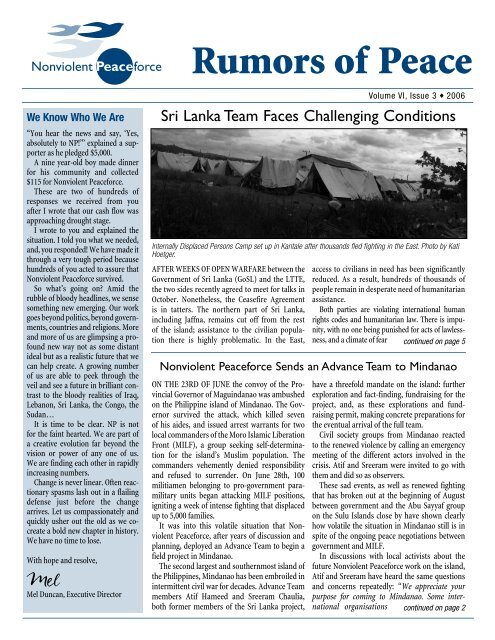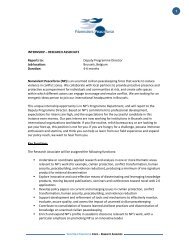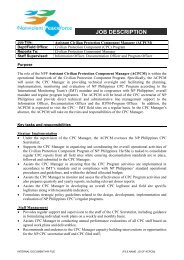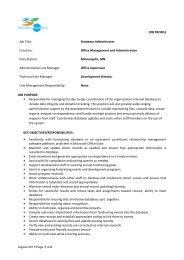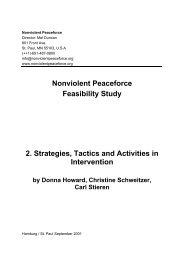Rumors of Peace - Issue 3 2006 - Nonviolent Peaceforce
Rumors of Peace - Issue 3 2006 - Nonviolent Peaceforce
Rumors of Peace - Issue 3 2006 - Nonviolent Peaceforce
You also want an ePaper? Increase the reach of your titles
YUMPU automatically turns print PDFs into web optimized ePapers that Google loves.
<strong>Nonviolent</strong> <strong>Peace</strong>force<br />
<strong>Rumors</strong> <strong>of</strong> <strong>Peace</strong><br />
We Know Who We Are<br />
“You hear the news and say, ‘Yes,<br />
absolutely to NP!’” explained a supporter<br />
as he pledged $5,000.<br />
A nine year-old boy made dinner<br />
for his community and collected<br />
$115 for <strong>Nonviolent</strong> <strong>Peace</strong>force.<br />
These are two <strong>of</strong> hundreds <strong>of</strong><br />
responses we received from you<br />
after I wrote that our cash flow was<br />
approaching drought stage.<br />
I wrote to you and explained the<br />
situation. I told you what we needed,<br />
and, you responded! We have made it<br />
through a very tough period because<br />
hundreds <strong>of</strong> you acted to assure that<br />
<strong>Nonviolent</strong> <strong>Peace</strong>force survived.<br />
So what’s going on Amid the<br />
rubble <strong>of</strong> bloody headlines, we sense<br />
something new emerging. Our work<br />
goes beyond politics, beyond governments,<br />
countries and religions. More<br />
and more <strong>of</strong> us are glimpsing a pr<strong>of</strong>ound<br />
new way not as some distant<br />
ideal but as a realistic future that we<br />
can help create. A growing number<br />
<strong>of</strong> us are able to peek through the<br />
veil and see a future in brilliant contrast<br />
to the bloody realities <strong>of</strong> Iraq,<br />
Lebanon, Sri Lanka, the Congo, the<br />
Sudan…<br />
It is time to be clear. NP is not<br />
for the faint hearted. We are part <strong>of</strong><br />
a creative evolution far beyond the<br />
vision or power <strong>of</strong> any one <strong>of</strong> us.<br />
We are finding each other in rapidly<br />
increasing numbers.<br />
Change is never linear. Often reactionary<br />
spasms lash out in a flailing<br />
defense just before the change<br />
arrives. Let us compassionately and<br />
quickly usher out the old as we cocreate<br />
a bold new chapter in history.<br />
We have no time to lose.<br />
With hope and resolve,<br />
Mel Duncan, Executive Director<br />
After weeks <strong>of</strong> open warfare between the<br />
Government <strong>of</strong> Sri Lanka (GoSL) and the LTTE,<br />
the two sides recently agreed to meet for talks in<br />
October. Nonetheless, the Ceasefire Agreement<br />
is in tatters. The northern part <strong>of</strong> Sri Lanka,<br />
including Jaffna, remains cut <strong>of</strong>f from the rest<br />
<strong>of</strong> the island; assistance to the civilian population<br />
there is highly problematic. In the East,<br />
Volume VI, <strong>Issue</strong> 3 ◆ <strong>2006</strong><br />
Sri Lanka Team Faces Challenging Conditions<br />
Internally Displaced Persons Camp set up in Kantale after thousands fled fighting in the East. Photo by Kati<br />
Hoetger.<br />
<strong>Nonviolent</strong> <strong>Peace</strong>force Sends an Advance Team to Mindanao<br />
On the 23rd <strong>of</strong> June the convoy <strong>of</strong> the Provincial<br />
Governor <strong>of</strong> Maguindanao was ambushed<br />
on the Philippine island <strong>of</strong> Mindanao. The Governor<br />
survived the attack, which killed seven<br />
<strong>of</strong> his aides, and issued arrest warrants for two<br />
local commanders <strong>of</strong> the Moro Islamic Liberation<br />
Front (MILF), a group seeking self-determination<br />
for the island’s Muslim population. The<br />
commanders vehemently denied responsibility<br />
and refused to surrender. On June 28th, 100<br />
militiamen belonging to pro-government paramilitary<br />
units began attacking MILF positions,<br />
igniting a week <strong>of</strong> intense fighting that displaced<br />
up to 5,000 families.<br />
It was into this volatile situation that <strong>Nonviolent</strong><br />
<strong>Peace</strong>force, after years <strong>of</strong> discussion and<br />
planning, deployed an Advance Team to begin a<br />
field project in Mindanao.<br />
The second largest and southernmost island <strong>of</strong><br />
the Philippines, Mindanao has been embroiled in<br />
intermittent civil war for decades. Advance Team<br />
members Atif Hameed and Sreeram Chaulia,<br />
both former members <strong>of</strong> the Sri Lanka project,<br />
access to civilians in need has been significantly<br />
reduced. As a result, hundreds <strong>of</strong> thousands <strong>of</strong><br />
people remain in desperate need <strong>of</strong> humanitarian<br />
assistance.<br />
Both parties are violating international human<br />
rights codes and humanitarian law. There is impunity,<br />
with no one being punished for acts <strong>of</strong> lawlessness,<br />
and a climate <strong>of</strong> fear continued on page 5<br />
have a threefold mandate on the island: further<br />
exploration and fact-finding, fundraising for the<br />
project, and, as these explorations and fundraising<br />
permit, making concrete preparations for<br />
the eventual arrival <strong>of</strong> the full team.<br />
Civil society groups from Mindanao reacted<br />
to the renewed violence by calling an emergency<br />
meeting <strong>of</strong> the different actors involved in the<br />
crisis. Atif and Sreeram were invited to go with<br />
them and did so as observers.<br />
These sad events, as well as renewed fighting<br />
that has broken out at the beginning <strong>of</strong> August<br />
between government and the Abu Sayyaf group<br />
on the Sulu Islands close by have shown clearly<br />
how volatile the situation in Mindanao still is in<br />
spite <strong>of</strong> the ongoing peace negotiations between<br />
government and MILF.<br />
In discussions with local activists about the<br />
future <strong>Nonviolent</strong> <strong>Peace</strong>force work on the island,<br />
Atif and Sreeram have heard the same questions<br />
and concerns repeatedly: “We appreciate your<br />
purpose for coming to Mindanao. Some international<br />
organisations continued on page 2
<strong>Rumors</strong> <strong>of</strong> <strong>Peace</strong><br />
PAGE Volume VI, <strong>Issue</strong> 3 ◆ <strong>2006</strong><br />
Updates from Around the World<br />
Europe<br />
Raising Awareness in the Capitals<br />
<strong>of</strong> Europe<br />
NP Europe Coordinator Alessandro Rossi<br />
and intern Jeremie Habig headed to Paris to<br />
attend the Salon des Initiatives de Paix there<br />
from June 2nd to 4th. Over ten thousand<br />
peace activists from across the globe met to<br />
exchange ideas, dreams, and experiences.<br />
Conference goers had the chance to visit a<br />
booth shared by NP and its member organisation<br />
Mouvement pour une Alternative <strong>Nonviolent</strong>e<br />
(MAN) to learn about our work from<br />
displays in English and in French.<br />
A few weeks later the NP Europe team was<br />
in Brussels for Couleur Café, an annual music<br />
festival. This year’s event included a “Village<br />
<strong>of</strong> Solidarity” where NGOs working in areas <strong>of</strong><br />
armed conflict showcased their work. Visitors<br />
to the NP exhibit were able to “feel” our Sri<br />
Lanka project and see a selection <strong>of</strong> local handicrafts.<br />
The display generated interest from<br />
many visitors and raised awareness <strong>of</strong> the work<br />
<strong>of</strong> <strong>Nonviolent</strong> <strong>Peace</strong>force around the world.<br />
North America<br />
A Season <strong>of</strong> Firsts in North America<br />
Nothing energizes and inspires advocates<br />
<strong>of</strong> peace more than gathering to share ideas<br />
and <strong>of</strong>fer mutual encouragement. There were<br />
two such gatherings during June, both <strong>of</strong><br />
them firsts for the North America region:<br />
a conference <strong>of</strong> the newly-formed United<br />
States <strong>Nonviolent</strong> <strong>Peace</strong>force Chapters Association<br />
(USNPCA), and the first regional conference<br />
<strong>of</strong> NP Member Organisations.<br />
The centerpiece <strong>of</strong> the USNPCA conference<br />
was eight hours <strong>of</strong> <strong>Nonviolent</strong> Conflict Intervention<br />
training, a program that will be available<br />
through NP Local Chapters later this fall.<br />
The rest <strong>of</strong> their agenda included the sharing<br />
<strong>of</strong> chapter formation stories and local success<br />
stories, fundraising brainstorms—and,<br />
<strong>of</strong> course, the process <strong>of</strong> becoming an <strong>of</strong>ficial<br />
NP Member Organisation with a national<br />
committees for ongoing work. Delegates<br />
approved a provisional mission statement<br />
that will now undergo ratification by local<br />
chapters. Contact the association for further<br />
information at www.usnpca.org.<br />
The first meeting <strong>of</strong> the North America<br />
Member Organisations took place in Berkeley,<br />
California. Representatives <strong>of</strong> thirteen <strong>of</strong> the<br />
twenty NP member organisations were on<br />
hand—Buddhist <strong>Peace</strong> Fellowship, Center<br />
for <strong>Nonviolent</strong> Communication, FOR-USA,<br />
Global <strong>Peace</strong> Services, Global Exchange, Pace<br />
e Bene, <strong>Peace</strong>workers, USNPCA, Voice <strong>of</strong><br />
Women for <strong>Peace</strong>, NP Canada, Tikkun, Michigan<br />
<strong>Peace</strong> Team, and CONTACT. The delegates<br />
learned about each others’ organisations<br />
and engaged in discussions about NP’s<br />
ongoing work in Sri Lanka while engaging<br />
strategic questions crucial to NP’s growth.<br />
Three Working Groups identified numerous<br />
ways that the individual member organisations<br />
and the NP network can advance each others’<br />
work. Examples include joint fundraising and<br />
public awareness campaigns, strengthening<br />
local chapters by incorporating NP-related<br />
work, developing local peace teams together,<br />
and sharing information and work on recruitment,<br />
assessment and training regarding<br />
international peace team deployments.<br />
Mindanao (cont. from 1)<br />
are investing heavily in development projects.<br />
But what is the use <strong>of</strong> tackling poverty<br />
without peace Your organisation’s agenda<br />
<strong>of</strong> protection and peace is the most necessary<br />
but least addressed. Why are so many other<br />
international efforts blind to the reality that<br />
protection should precede development”<br />
Local groups in Mindanao are working<br />
to sustain the ceasefires, encourage nonviolence,<br />
and foster peaceful relations between<br />
communities. They also strive to make the<br />
concerns <strong>of</strong> ordinary people heard in the<br />
<strong>of</strong>ficial peace process and to articulate the<br />
need for greater international support in<br />
pursuit <strong>of</strong> these objectives and to overcome<br />
the “culture <strong>of</strong> silence.”<br />
The Advance Team’s day-to-day association<br />
with the advocacy group that worked<br />
hard to halt the mini-war in Maguindanao<br />
has prompted serious requests from local<br />
civil society organisations for an urgent<br />
deployment <strong>of</strong> NP civilian peacekeepers.<br />
An NP presence can provide moral solidarity<br />
to the war-battered people—a<br />
much more valuable form <strong>of</strong> assistance<br />
than material aid.<br />
We hope to have found the resources to<br />
comply with this request and send a full team<br />
to Mindanao before the end <strong>of</strong> this year.<br />
<strong>Rumors</strong> <strong>of</strong> <strong>Peace</strong> is published three<br />
times a year by <strong>Nonviolent</strong> <strong>Peace</strong>force<br />
(NP), a nonpartisan unarmed peacekeeping<br />
force composed <strong>of</strong> trained civilians<br />
from around the world. In partnership<br />
with local groups, NP members<br />
apply proven nonviolent strategies to<br />
protect human rights, deter violence,<br />
and help create space for local peacemakers<br />
to carry out their work.<br />
Send comments or questions to<br />
info@nonviolentpeaceforce.org or Editor,<br />
<strong>Rumors</strong> <strong>of</strong> <strong>Peace</strong>, 425 Oak Grove, Minneapolis,<br />
MN 55403.<br />
Visitors at the NP exhibit at Couleur Cafe, Belgium.<br />
Are you receiving our e-news<br />
Send an email to<br />
subscribe@nonviolentpeaceforce.org<br />
Include your name and address<br />
so we can match your record.
<strong>Rumors</strong> <strong>of</strong> <strong>Peace</strong><br />
PAGE Volume VI, <strong>Issue</strong> 3 ◆ <strong>2006</strong><br />
Youth Conference Connects By Maya Main<br />
This summer, I interned with the <strong>Nonviolent</strong> <strong>Peace</strong>force as a Youth<br />
Organizer, preparing NP’s 2nd annual Youth Conference on Nonviolence.<br />
Thirteen participants from North Minneapolis and St. Cloud,<br />
ages 14-22, represented a wide range <strong>of</strong> cultures and ethnicities, with<br />
all <strong>of</strong> the students being people <strong>of</strong><br />
color. The conference focused on<br />
personalizing the concept <strong>of</strong> nonviolence<br />
into our everyday lives,<br />
from how we communicate with<br />
each other to how we resolve conflicts.<br />
The weekend was extremely<br />
powerful and very telling. It was<br />
also a great opportunity for NP<br />
to create relationships with urban<br />
youth. While our organisation<br />
focuses on international conflict,<br />
it is important to interact with our<br />
neighbors, young people in particular,<br />
as many <strong>of</strong> them experience<br />
conflict on a daily basis.<br />
One <strong>of</strong> the most significant things the facilitators did this weekend<br />
was listen and empathize with the experiences <strong>of</strong> the participants.<br />
We did not tell the youth how they should live nonviolently because<br />
we recognized the drastic differences <strong>of</strong> our varied experiences and<br />
backgrounds. Because you cannot force someone to be nonviolent, the<br />
curriculum for the conference allowed the participants to decide for<br />
themselves how they could effectively apply the tools we learned. We<br />
role-played conflicts that we were currently experiencing. I encouraged<br />
the participants to think outside the box but also to challenge<br />
the applicability and feasibility <strong>of</strong> the tools and scenarios presented<br />
to them. Self-directed change, I<br />
believe, is the most powerful and<br />
sustaining type <strong>of</strong> change. Having<br />
made a connection with the North<br />
Minneapolis and Saint Cloud communities,<br />
we must now focus our<br />
training curricula on empowering<br />
youth to use their own stories and<br />
assist them in identifying how nonviolence<br />
can be useful in their lives.<br />
I can confidently say that each<br />
participant, including myself, walked<br />
away on Sunday morning having<br />
changed in his or her own unique<br />
way. Recently, I met with the director<br />
Urban youth at NP sponsored conference.<br />
<strong>of</strong> the North Minneapolis organisation<br />
where some <strong>of</strong> the youths were from. I briefed him on the conference<br />
and discussed next steps. He showed me an article that one <strong>of</strong><br />
the female participants had written: she wrote about how she was now<br />
evaluating different situations where she could respond nonviolently<br />
and prevent conflicts from escalating into violence. Hearing this, even<br />
from just one participant, made me feel that we had been successful.<br />
<strong>Nonviolent</strong> <strong>Peace</strong>force Training for Trainers Gathering in Thailand<br />
Ten Days in July—Building<br />
for the Future<br />
by Jan Passion<br />
<strong>Nonviolent</strong> <strong>Peace</strong>force plans to<br />
increase our capacity so that NP could mobilize<br />
hundreds or even thousands <strong>of</strong> trained<br />
peace workers to a conflict situation. To this<br />
end, NP held our first Training for Trainers<br />
in Thailand in July—bringing together 26<br />
peace trainers from 19 different countries<br />
and all <strong>of</strong> the inhabited continents, with a<br />
wealth <strong>of</strong> experience from many different<br />
conflict zones.<br />
NP is now ready to provide the essential<br />
“Core Training” to large numbers <strong>of</strong> field<br />
staff in multiple languages and to <strong>of</strong>fer<br />
multiple Core Trainings at the same time.<br />
This is a critical step in NP’s development<br />
and our plan to grow exponentially and thus<br />
increase our impact in the field <strong>of</strong> nonviolent<br />
intervention.<br />
Working to build on NP’s experience<br />
on the ground, the training included two<br />
members from NP’s Sri Lanka Project and<br />
five previous leaders <strong>of</strong> NP’s Core Trainings.<br />
Striving to learn from similar third party<br />
nonviolent intervention organisations, two<br />
trainers from <strong>Peace</strong> Brigades International<br />
also attended.<br />
For ten days we learned about NP, shared<br />
our diverse experiences, talked about the<br />
skills needed for Field Team Members for<br />
NP and practiced the delivery <strong>of</strong> various<br />
activities. We created and participated in<br />
role plays, deepened our own practice and<br />
understanding <strong>of</strong> nonviolence, improved<br />
our intercultural communication skills and<br />
talked about the dynamics and challenges<br />
<strong>of</strong> working in intercultural teams in conflict<br />
zones. For a half-day, we participated in a<br />
simulation <strong>of</strong> life in a war zone and <strong>of</strong> how<br />
field staff work to protect civilian lives in<br />
such situations, building strong training<br />
teams and preparing ourselves to be able<br />
to deliver solid, successful Core Trainings<br />
for NP.<br />
The group included roughly equal numbers<br />
<strong>of</strong> women and men and people from the<br />
global south and the global north. The age<br />
range was from 27 through 65. The years<br />
and wealth <strong>of</strong> experience found in this group<br />
<strong>of</strong> trainers was most inspiring—a gathering<br />
<strong>of</strong> teachers, NGO workers, activists, trainers,<br />
and field workers with a passionate commitment<br />
to nonviolence, justice and peace.<br />
Together we are building viable alternatives<br />
to war.<br />
Nonviolence trainers at the opening <strong>of</strong> the<br />
Training <strong>of</strong> Trainers. Photo by Jan Passion.
<strong>Rumors</strong> <strong>of</strong> <strong>Peace</strong><br />
PAGE Volume VI, <strong>Issue</strong> 3 ◆ <strong>2006</strong><br />
Voices from the Field<br />
Linda Sartor (Sri Lanka)<br />
Recent experiences in Sri Lanka remind me<br />
<strong>of</strong> the preciousness <strong>of</strong> life. My team in Jaffna,<br />
in northern Sri Lanka, has been trying to support<br />
a village particularly vulnerable to political<br />
acts <strong>of</strong> violence coming from unknown<br />
perpetrators outside the village. We received<br />
a call from one <strong>of</strong> our contacts informing us<br />
<strong>of</strong> a shooting occurring that very moment and<br />
asking for our support. We helped as much as<br />
we could from our <strong>of</strong>fice that night and then<br />
went to the village the next morning. There, I<br />
took in the saddest scene I have ever encountered.<br />
In one household, there had been a<br />
massacre <strong>of</strong> seven people plus a neighbor—<br />
eight people in all, including one baby and a<br />
four-year old child.<br />
Needless to say, the people in the village<br />
(who had fled to a nearby church for protection)<br />
were in a state <strong>of</strong> shock and fear. At their<br />
request, we began to provide presence, which<br />
helped reduce their level <strong>of</strong> fear. We are not in<br />
the position to give any guarantees, but it is<br />
much less likely that such incidents will occur<br />
while international peacekeepers are present.<br />
One evening that week, we attended a community<br />
meeting at which the people <strong>of</strong> the<br />
village were discussing their next steps. Some<br />
wanted to leave because they felt unsafe in<br />
their homes. Yet, they realized that as IDPs<br />
(Internally Displaced People), they would<br />
likely suffer worse difficulties and dangers.<br />
Others did not want to leave—they had been<br />
living on this beautiful island for years and<br />
held fond memories <strong>of</strong> their village that had<br />
been peaceful even during the war. People<br />
unanimously wanted security and to feel<br />
safe again. The security forces present on the<br />
island had been accused <strong>of</strong> being involved in<br />
the violent incident, thus people felt threatened<br />
by the very group that was supposed to<br />
be protecting them.<br />
Through our unarmed nonpartisan presence,<br />
we were able to provide a sense <strong>of</strong> security<br />
to the people <strong>of</strong> this community. As the<br />
days passed, we could see a marked difference<br />
in their fear and tension levels. One day, we<br />
were unable to be there during the daytime<br />
but returned for the night. As we drove into<br />
the compound, we saw beaming smiles <strong>of</strong><br />
welcome and relief on their faces. At that<br />
point, they asked us for 24-hour presence.<br />
We immediately made arrangements to do so<br />
for a period <strong>of</strong> time. The following day, I was<br />
there by myself and was told that even though<br />
I was there alone, it made a big difference.<br />
I feel amazed and hopeful that just one<br />
unarmed person can have such an impact on<br />
a community’s sense <strong>of</strong> safety, and I think it<br />
presents an exciting model to the world that<br />
security can be provided without weapons.<br />
Actually, I feel much safer doing this work<br />
without a weapon than I would if I had one.<br />
I love this work.<br />
AIla Jibo (Kenya),<br />
Fast-Track Field Team Member,<br />
March <strong>2006</strong><br />
When I received word that my application<br />
to <strong>Nonviolent</strong> <strong>Peace</strong>force Sri Lanka (NPSL)<br />
had been accepted, I was elated. The opportunity<br />
to work as an advocate <strong>of</strong> nonviolence,<br />
justice and peace is the chance <strong>of</strong> a lifetime as<br />
I believe we are witnessing an upsurge in violence<br />
around the world. I worked in Sri Lanka<br />
from 2002-04 with the Voluntary Service<br />
Overseas NGO as an Information Technology<br />
Instructor, an experience that broadened my<br />
view on development issues.<br />
I arrived in Sri Lanka on the 8th <strong>of</strong> March,<br />
<strong>2006</strong>, and immediately went to Kotmale, where<br />
a NPSL staff retreat was underway. It was wonderful<br />
to interact with the staff and learn about<br />
NPSL’s work and the challenges faced by the<br />
Field Team Members. I was able to picture the<br />
kind <strong>of</strong> work the FTMs were doing and what<br />
to expect once I was in the field. After a few<br />
days <strong>of</strong> orientation in Colombo I headed north<br />
to Jaffna. As we passed through many checkpoints<br />
(both Government and LTTE), I noticed<br />
numerous destroyed buildings and homes lost<br />
to war. There are many Internally Displaced<br />
Persons from Jaffna and this is one <strong>of</strong> the challenges<br />
to finding peace. Resentment from the<br />
people (and lately, from many <strong>of</strong> the university<br />
students in particular) towards the Sri Lankan<br />
Army escalates into violence from time to time.<br />
Due to such resentment towards the Sri<br />
Lankan army and police in Jaffna, locals think<br />
Photo by Emily Rosenberg<br />
twice before reporting crimes and criminals<br />
<strong>of</strong>ten take advantage <strong>of</strong> this fact. In one incident,<br />
gangs from two villages were clashing<br />
over the harvesting <strong>of</strong> sand from an illegal area,<br />
resulting in one <strong>of</strong> the gangs terrorizing a village<br />
and throwing a petrol bomb at a house.<br />
The police were informed but the criminals<br />
have remained elusive. When my team visited<br />
the police, they gave us an opportunity to follow<br />
up on the case and invite the villagers into a<br />
dialogue to find a solution to the problem.<br />
Next I headed to Mutur in the east <strong>of</strong> Sri<br />
Lanka. The majority <strong>of</strong> inhabitants in town are<br />
Muslims but the Tamils and the Sinhalese have<br />
large communities in the surrounding area.<br />
I am optimistic because the NP Mutur team<br />
has facilitated the restructuring <strong>of</strong> the Mutur<br />
<strong>Peace</strong> Committee to make it more inclusive <strong>of</strong><br />
the different groups. The situation in Mutur<br />
is very volatile due to the presence <strong>of</strong> both the<br />
Sri Lankan army and LTTE in close proximity<br />
and also due to factors such as competition<br />
between the three communities for land and<br />
government services. NP Mutur is working<br />
strategically with the <strong>Peace</strong> Committee to<br />
enhance dialogue between the three communities<br />
in the area. I had the opportunity to<br />
accompany the FTMs there on a mission to<br />
consult one <strong>of</strong> the Tamil NGOs in organizing<br />
a meeting with the Sinhalese <strong>Peace</strong> Committee.<br />
I also attended a meeting facilitated<br />
by NP Mutur between the Muslims at a local<br />
village and Tamils in an LTTE-controlled area<br />
regarding a recent killing. The meeting ended<br />
in a spirit <strong>of</strong> reconciliation and forgiveness.<br />
NP was requested to keep monitoring the area<br />
since it has not been safe for Tamils to come to<br />
the market into Muslim areas.<br />
I am looking forward to the challenge <strong>of</strong><br />
helping Sri Lankans feel more secure and<br />
expanding nonviolent opportunities to<br />
resolve and prevent conflicts.<br />
<strong>Peace</strong>,
<strong>Rumors</strong> <strong>of</strong> <strong>Peace</strong><br />
PAGE Volume VI, <strong>Issue</strong> 3 ◆ <strong>2006</strong><br />
Voices from the Field/Advocate Team Member<br />
Ann Frisch, new member <strong>of</strong> the NP Advocate<br />
Team, met with NP Board Co-chair<br />
Claudia Samayoa while she was in Guatemala<br />
last month. Ann was a volunteer with<br />
the American Friends Service Committee<br />
in Guatemala from 1963-1965 and was<br />
returning to see friends in the rural communities<br />
<strong>of</strong> Patzun and Chimaltenango. During<br />
her stay there, she heard horror stories<br />
<strong>of</strong> bus passengers being routinely robbed<br />
and assaulted. Claudia Samayoa confirmed<br />
this practice by organized crime<br />
with police being complicit or unwilling<br />
to protect the public. Her organisation<br />
was one <strong>of</strong> those who met the next day<br />
with United Nations Rapporteur Mr. Philip<br />
Alston to report on human rights violations<br />
in Guatemala. Among them are “social<br />
cleansing” <strong>of</strong> the poor, lesbians and gays,<br />
juvenile delinquents, gang members, and<br />
women and children. Ann has a copy <strong>of</strong> the<br />
report and can email it to anyone interested.<br />
Ann is a recently retired faculty member<br />
<strong>of</strong> the University <strong>of</strong> Wisconsin Oshkosh. She<br />
continues to teach a class in the Master’s Certificate<br />
program in Global Education. Her<br />
course is called “On Becoming a Global Citizen.”<br />
The work <strong>of</strong> NP will be included this<br />
year, along with Gene Sharp’s book Waging<br />
<strong>Nonviolent</strong> Struggle. She first learned about<br />
NP from Mel Duncan at a Friends General<br />
Conference. She has been a supporter since<br />
that time. Ann will be selling NP peace bonds<br />
at Christmas bazaars and joining Erika<br />
Schatz for an upcoming fundraising tour in<br />
Wisconsin.<br />
•••<br />
The air was alive with enthusiasm<br />
as 20 people gathered in May for a NP fundraiser<br />
at The Helen M. Casey Center for Nonviolence<br />
in Midland, Michigan. I had volunteered<br />
at the Minneapolis <strong>of</strong>fice in February<br />
and was excited to tell others about it. With<br />
very little effort we raised $2500. The Saturday<br />
afternoon event was short and simple:<br />
a light lunch, a brief sharing <strong>of</strong> my volunteer<br />
experience, NP history and current efforts<br />
in Sri Lanka, Q&A time, and viewing <strong>of</strong><br />
the 12-minute NP DVD. We also had <strong>Peace</strong><br />
Bonds and other material available.<br />
People definitely want to find something<br />
hopeful that they can say Yes to when they<br />
say NO to war in order to be part <strong>of</strong> a viable,<br />
nonviolent effort to create a more peaceful<br />
world. Having an NP fundraiser is a great<br />
way to help them achieve this goal.<br />
—Jeanne Lound Schaller<br />
Opportunities for Support<br />
Sri Lanka: $30,000 for a peacekeeper for one year.<br />
Philippines (Mindanao): $12,500 for a peacekeeping team <strong>of</strong> five people for one month.<br />
Regional Training: $2,840 for accommodation, travel and tuition for one person, preferably<br />
from the global south, to attend a Regional Core Training on nonviolent techniques.<br />
For more information or to make a donation contact Erika Shatz: 612-871-0005 or<br />
eshatz@nonviolentpeaceforce.org<br />
To donate stock or mutual funds to the <strong>Nonviolent</strong> <strong>Peace</strong>force, contact Tamra Falk at<br />
612-871-0005 or tfalk@nonviolentpeaceforce.org. Please contact Tamra each time you<br />
make a donation so we can give you credit for your gift.<br />
Sri Lanka (cont. from 1)<br />
due to disappearances and killings <strong>of</strong> journalists,<br />
clergy and businessmen, even in Colombo.<br />
The country faces a humanitarian crisis<br />
which is a direct result <strong>of</strong> the ongoing human<br />
rights crisis. According to the UNHCR, 240,000<br />
people in the North and East have been displaced.<br />
The recent ruling by the Sri Lanka<br />
Monitoring Mission that the killing <strong>of</strong> the 17<br />
civilian aid workers employed by Action Contre<br />
le Faim in Mutur is most likely attributable<br />
to Government security forces highlights the<br />
crisis and the urgent need for the Government<br />
<strong>of</strong> Sri Lanka to ensure adequate accountability.<br />
International Human Rights agencies are lobbying<br />
hard for an international human rights<br />
monitoring mission under UN auspices.<br />
Against this background, NPSL deployed 12<br />
new Field Team members, an extremely challenging<br />
task. During the staff retreat, fighting<br />
between the LTTE and the GoSL erupted in<br />
Jaffna and the Jaffna team members have<br />
been unable to return there. Due to the security<br />
situation in Trincomalee, the Mutur and<br />
Trinco team are operating from outside the<br />
district and conducting restricted activities<br />
mostly in the IDP camps in Kantale. Only<br />
the Batti and Valaichchenai teams are able to<br />
conduct full operations focusing on the many<br />
child abductions, identifying safe places and<br />
supporting local actors working in IDP camps.<br />
However, these two teams also faced restricted<br />
access to areas where they previously were<br />
able to work.<br />
There is good news: As most <strong>Rumors</strong> <strong>of</strong><br />
<strong>Peace</strong> readers know, on 21 May <strong>2006</strong> a grenade<br />
thrown at the Mutur <strong>of</strong>fice <strong>of</strong> <strong>Nonviolent</strong><br />
<strong>Peace</strong>force injured field team member Fabijan<br />
Periskic and two passers-by. Two international<br />
organisations with humanitarian missions<br />
were also attacked. Fabijan remains<br />
committed to <strong>of</strong>fering protection to those who<br />
seek nonviolent solutions, as do all the NP<br />
Sri Lanka staff. Happily, Fabijan has now<br />
returned to work.<br />
As the situation has worsened, the NP Sri<br />
Lanka team has been conducting regular risk<br />
assessments and remains committed to their<br />
work, which is not only protecting lives and<br />
ensuring delivery <strong>of</strong> relief to displaced persons<br />
but also building bridges between the ethnic<br />
communities in conflict, following up on past<br />
positive outcomes. In the midst <strong>of</strong> fear and<br />
violence, we continue to protect people and<br />
support those working for peace in Sri Lanka.
<strong>Rumors</strong> <strong>of</strong> <strong>Peace</strong> • <strong>2006</strong> <strong>Issue</strong> 3<br />
<strong>Nonviolent</strong> <strong>Peace</strong>force<br />
425 Oak Grove<br />
Minneapolis, MN 55403, USA<br />
Tel 612 871 0005 / Fax 612 871 0006<br />
nonviolentpeaceforce.org<br />
NONPROFIT ORG.<br />
U.S. POSTAGE PAID<br />
NONVIOLENT<br />
PEACEFORCE<br />
Are you receiving our e-news<br />
If we don’t have your email address you are missing breaking<br />
news and stories about our work (about once a month). Send<br />
an email to subscribe@nonviolentpeaceforce.org and include<br />
your name and postal address so we can match your record.<br />
Give the Gift <strong>of</strong> <strong>Peace</strong> on Earth!<br />
Support unarmed peacekeepers working to reduce violence<br />
around the world by giving beautifully-designed <strong>Peace</strong> Bonds this<br />
holiday season. <strong>Peace</strong> Bonds range from $10-$500 in price, and purchasing<br />
<strong>Peace</strong> Bonds is a great way to become directly involved in the<br />
work that NP does in the field.<br />
The six <strong>Peace</strong> Bonds, many designed by children, are beautiful;<br />
each comes with a Gift Description Page, which explains the work<br />
your donation supports. The purchase <strong>of</strong> a <strong>Peace</strong> Bond is fully tax<br />
deductible.<br />
This holiday season, log on to www.buypeacebonds.org and do all<br />
<strong>of</strong> your gift buying online! Or, call or write the NP Minnesota <strong>of</strong>fice to<br />
order <strong>Peace</strong> Bonds. For family, friends, community, teachers, or kids,<br />
<strong>Peace</strong> Bonds make perfect holiday gifts! <strong>Peace</strong> Bonds also make wonderful<br />
holiday cards, as we learned when a supporter recently ordered<br />
more than 400 to send this holiday season!<br />
To order <strong>Peace</strong> Bonds, log on to www.buypeacebonds.org or call<br />
612-871-0005. You may also write to <strong>Nonviolent</strong> <strong>Peace</strong>force, c/o <strong>Peace</strong><br />
Bonds, 425 Oak Grove Street, Minneapolis, MN 55403.<br />
$10 – 2 hours <strong>of</strong> <strong>Peace</strong><br />
Bringing People Together : Bringing<br />
people together in a neutral setting<br />
encourages mutual respect and<br />
understanding.<br />
$25 – The Space for <strong>Peace</strong><br />
The Heart <strong>of</strong> the Community : Our <strong>of</strong>fices<br />
in the heart <strong>of</strong> the community help demonstrate<br />
that we are not for one side or<br />
the other but the side <strong>of</strong> the people.<br />
$50 – A Day <strong>of</strong> <strong>Peace</strong><br />
Rumor Control : Rumor control can<br />
prevent unnecessary retaliation.<br />
$100 – 2 Days <strong>of</strong> <strong>Peace</strong><br />
Election Monitoring : International<br />
presence during elections empowers<br />
citizens to express their beliefs and<br />
ideals.<br />
$250 – 50 Hours <strong>of</strong> <strong>Peace</strong><br />
Safe Passages : Unarmed peacekeepers<br />
protect vulnerable refugees as they<br />
recover and rebuild.<br />
$500 – 100 Hours <strong>of</strong> <strong>Peace</strong><br />
No Child Should be a Soldier : Preventing<br />
children from recruitment<br />
into organized armed forces creates a<br />
better future for us all.<br />
Ela Gandhi, granddaughter <strong>of</strong><br />
Mahatma Gandhi, spoke about<br />
100 years <strong>of</strong> Satyagraha during<br />
the unveiling <strong>of</strong> the new <strong>Peace</strong><br />
Bond Designs. Photo by Greg<br />
Tarczynski.


